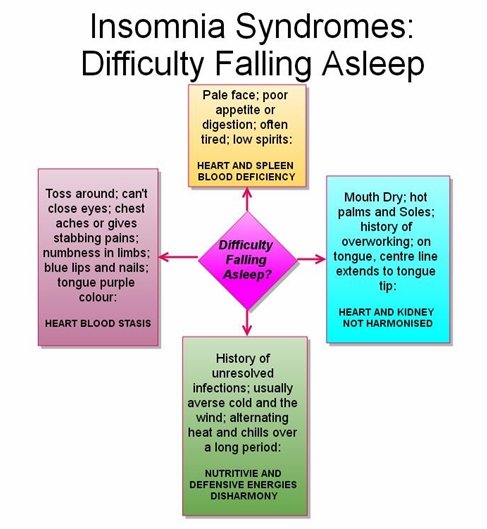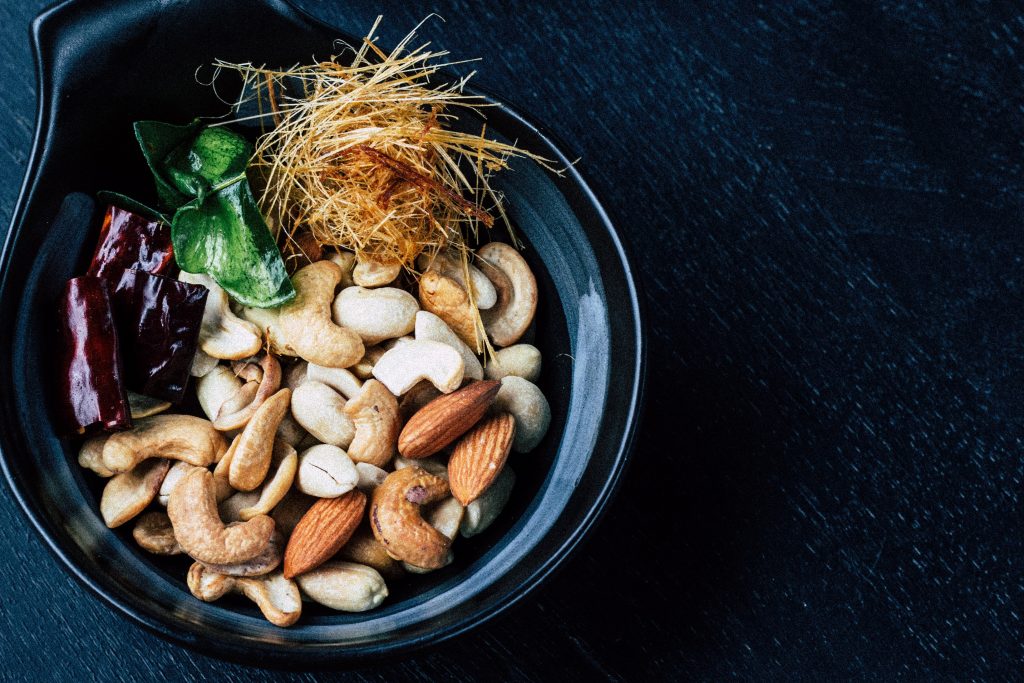Subscribe to the Newsletter
If you are interested in understanding how Traditional Chinese Medicine can improve your life sign up to my newsletter for the latest updates.

Do you have difficulty falling asleep? Is it hard to get off? Slow to fade away at bedtime? Can’t drift into that unconsciousness which seems so easy for everyone else? The Chinese have had your same problem for 3000 years too! And their doctors have thought hard about it. They eventually split it into four main kinds of ‘syndrome‘. However, before beginning, please check our page on Insomnia, because there are many conditions which you might think come under ‘difficulty falling asleep’, but don’t! |  © Rohit Seth Dreamstime.com
|

So, if you have an ongoing difficulty falling asleep, have a look at which of the syndromes described above seems closest.
Then click on the link below to take you to the page that describes that syndrome in more detail.
Also, you might be someone who not only has difficulty falling asleep but also be someone who often wakes up in the night, or suffers from excessive dreaming.
Alternatively, if you have sleep apnea, click here: likewise for restless sleep. Those have different syndromes although the above four contribute to them too.
Here are the four difficulty falling asleep syndromes summarised above. Don’t worry if the name you click on seems mysterious or frightening, or even misleading: these are just the names of the syndromes. Click on the link to read more about them.
There are hundreds of tips, both on the internet and in books, for people who have difficulty falling asleep. But until now, they haven’t been matched with the syndromes actually causing difficulty falling asleep.
That means you don’t know which suggestion might help you.
So for each of the different syndromes we’re going to add the suggestions that we think probably help most.
You can contribute in the section below or on our Facebook page.
However, before we get to these suggestions, remember that sleep is a good habit which you’ve lost, or got out of. Like any good habit, it’s harder to acquire once you’ve lost it than a bad habit.
But remember, many good habits take 28 days to become habitual. So don’t give up just because it doesn’t work at first.
I found this tip in a book well over 30 years ago. I’ve suggested it to lots of patients and many find it works well.
First you must spend a few evenings noting when and if there is a time in the evening when one or more of the following happens:

These messages comes from a million years of genetic evolution and inheritance: in other words, what our genes found actually worked.
Each one could be saying
In my personal experience, if I yawn once or twice, I shall yawn again after about another 20 minutes. So I have twenty minutes to get ready for bed, to climb in and be ready to turn off the light.
20 minutes! If you are in bed when the second yawn or desire to close your eyes occurs, TURN OFF THE LIGHT! Your body is turning over to sleep mode. After a few evenings’ practice, most people find that they naturally get to sleep quite fast.
In my experience, it’s usually between 9pm and 10-30pm. If you ignore it, and of course you easily can, then you start waking up again. If that happens you may be able to keep going for another hour or two before you start feeling really tired again.
By then, you’ve wasted several hours when your body was actually primed and ready to take you down to the theta and delta wave levels of sleep. That’s where most Human Growth Hormone is secreted and you get the deepest most restorative sleep of the night.
However, I have known people for whom this time was much earlier, and for some it is later – for example if you are an ‘OWL’. But the warning is nearly always still there if you choose to look out for it.

The following syndromes may seem a little extreme: you may not have developed them fully. As they grow older, many people in the West have a combination, such as ‘(Heart and) Spleen Deficiency’, with ‘(Heart and) Kidney Yin deficiency’. The Spleen and Kidney deficiencies come first, only later affecting the Heart.
The following is a summary: there’s far more about it here.
This occurs where (to use the quaint description from Chinese medicine) your Blood isn’t thick enough to receive and nourish your Spirit as it relaxes: the bed (Blood) isn’t comfortable!
Briefly, symptoms of this cause of difficulty falling asleep include (but you may only have some of them):
However, click on the link to read more about it and how it tends to develop in people.
If your difficulty falling asleep is due to this syndrome, then there are many things you can do to help. Although not a serious health condition, it can, in time and if not treated, lead to other more serious conditions, so don’t ignore it.
There is much more about this here.
If you decide that this syndrome is causing your difficulty falling asleep, you should certainly see your doctor for his advice, and then visit your friendly neighbourhood acupuncturist or Chinese medicine practitioner. This syndrome can sometimes become serious quickly.
With this syndrome, food before bedtime is not usually a good idea because it puts an additional load on the Heart.
I’ve noticed, however, that many people with this syndrome like a little alcohol before bed. In Scotland, this seems to be Whisky. They say it helps them get to sleep, but their pulses suggest to me that their sleep is un-refreshing, to say the least.
Sleeping partly propped up helps some people who have difficulty falling asleep because of this syndrome.
For more on this, click here.
If you’ve decided this is the syndrome that gives you difficulty falling asleep, then your body is still fighting an underground battle against an invader. Usually, you get rid of this only after having another full-blown fever during some other acute disease, like another cold.
Meantime, you will have signs of hot and cold, small flushes of perspiration from time to time, and palpitations etc.. Avoid eating food before bed or in the evening that makes you hotter, such as rich, oily, fatty, sweet or spicy food. Vegetables and rice are better.
Mentally, one would think that counting sheep or counting backwards would work but the problem causing difficulty falling asleep is that your body is on ‘Yang-Alert’. You can’t settle.
Consequently, don’t take caffeine or similar stimulants!
That being so, if you have the energy, particularly good for you before bed are:
For more, click Nutritive and Defensive Energies Disharmony.
There’s more about this here. Briefly, this is what happens:
If you are having difficulty falling asleep from this syndrome, the following suggestions may help. However, please do realise that this particular syndrome doesn’t usually improve without treatment by someone who knows what to do and how to advise you.
Even then it takes time. Moreover, what you do yourself, and just as important, what changes you make in your life, long-term, can make a huge difference. Even so, this syndrome seldom improves quickly. Anyway, here are some suggestions!

Click for more on Heart and Kidney not harmonised
Click on the following links :

Stay in Touch!
No spam, only notifications about new articles and updates.

Book a Video consultation if you want to know more about your symptoms

This Introductory Chinese medicine course introduces you to the amazing thinking behind this ancient medicine, now increasingly in demand.

The Scottish College for Chinese medicine provides introductory courses for all, explaining Chinese medicine and its cultural background.

Master Tung’s acupuncture is a hidden treasure, lost to China but recovered in Taiwan from where it spread round the world.

Knee pain has five main causes. It’s certainly worth trying acupuncture before you resort to surgery!
Subscribe to the Newsletter
If you are interested in understanding how Traditional Chinese Medicine can improve your life sign up to my newsletter for the latest updates.
Subscribe to the Newsletter
If you are interested in understanding how Traditional Chinese Medicine can improve your life sign up to my newsletter for the latest updates.